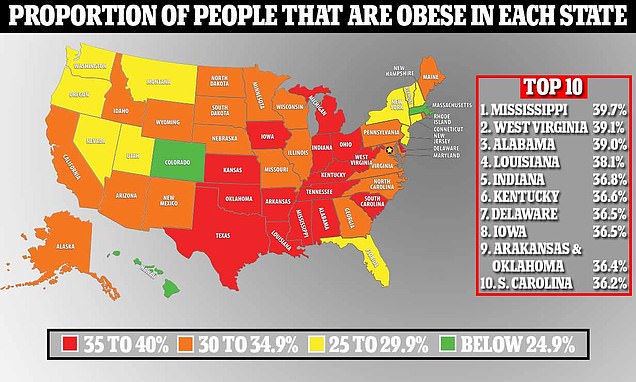Woke ‘experts’ warn the word ‘obesity’ is RACIST and suggest ‘people with larger bodies’ instead University of Illinois Chicago wants to ban the word ‘obesity’ because focusing on body size is ‘rooted in racism’By Gina Martinez
Multiple woke academics now claim the word ‘obesity’ is racist and should be dropped in favor of ‘people with larger bodies.’
The University of Illinois Chicago‘s school of public health published a health brief titled: ‘Addressing weight stigma and fatphobia in public health’ that explored ‘the association between racism, weight, and health.’
According to Amanda Montgomery RD, public health’s focus on preventing obesity has brought in an increase of negative attitudes towards ‘people with larger bodies’ – her preferred alternative term – and is currently one of the only socially acceptable forms of discrimination.
The brief claims that public health approaches related to obesity can be harmful because of the focus on one outcome – weight loss- and because it tends to ignore the root cause of the issue.
Academics say many of the causes are rooted in discrimination borne of settlers driving Native Americans off their land, then forcing black and Hispanic workers to farm that land for low pay.
Amanda Montgomery RD wrote that public health’s focus on preventing obesity has brought an increase of negative attitudes at people with larger bodiesAt the lecture University of California, Irvine associate professor Sabrina Strings spoke about the racist roots of fatphobia, which she claims goes all the way back to slavery‘The public health field has not taken a critical look at this research, focusing on the narrative that weight is controllable and a personal responsibility,’ the brief says. ‘If the goal is to find the most ethical and effective strategies to achieve optimal public health, there needs to be an alternative to ‘obesity’ and weight-focused approaches and a shift in understanding of weight stigma as a social justice issue.’
America is the fattest country in the western world with an estimated 40 percent of people — or 138 million — being obese. It is followed by New Zealand (30 percent), Canada (29.4 percent) and Australia (29 percent).
President Joe Biden will reveal his plans for tackling obesity this September, and has already set targets of improving physical activity and reducing diet-related diseases — like type 2 diabetes — nationally.
There is statistical evidence that the illness disproportionately affects minority groups, with white people up to six times less likely to suffer from diabetes than Americans who are black, Latino or Native American.
Doctors say obesity is triggered by consuming more calories than are burned in a day, typically from fatty and sugary foods. It is becoming a bigger problem in modern life because of more sedentary lifestyles.
They say people who are obese are at risk of day to day health problems including shortness of breath, often feeling tired, joint and back pain, low self-esteem and feeling isolated.
It may also lead to more serious health problems including type 2 diabetes, high blood pressure, reduced fertility and heart disease.
But according to the brief the focus on body size is rooted in racism, claiming that previously a majority of societies actually favored larger bodies but that all changed due to racism and eugenics.
Montgomery wrote that race scientist, including Charles Darwin, created a ‘hierarchy of civilization’ that placed people of color, specifically black people, at the bottom, because they were considered to be ‘less civilized which was justified by ‘fatness’ and other differing body characteristics.
‘Fatness was used as a marker of ‘uncivilized behavior’ while thinness was ‘more evolved’,’ she wrote. ‘This idea was maintained throughout the United States in the 19th and 20th centuries, as a way to justify slavery, racism and classism, and control women through ‘temperance’. This ideology has perpetuated Desirability Politics- where thinness and whiteness are given more access to social, political and cultural capital.’
The University of Illinois Chicago’s school of public health published a health brief titled: ‘Addressing weight stigma and fatphobia in public health’The above map shows the proportion of people that are obese by state. The top obesity rates were in Mississippi, West Virginia and Alabama – while the lowest rates were in Colorado and Massachusetts. It is from a report by medical drugs provider NiceRx, and based on figures from the Centers for Disease Control and PreventionIn addition, the brief says that although nutrition and exercise are important, racism within the food environment is also a cause of obesity among minorities.
‘As presented by Soul Fire Farm, the U.S. food system is built on stolen land using stolen labor from Black and Latinx indigenous people,’ the brief says. ‘Not only has this created a large scale food apartheid and trauma for people indigenous to this land, it has caused a disconnection of indigenous people from their cultural practices and identities.’
Most recently the Institute for Bioethics & Health Humanities at the University of Texas Medical Branch in Galveston hosted a lecture on fatphobia and racism.
At the lecture University of California, Irvine associate professor Sabrina Strings spoke about the racist roots of fatphobia, which she claims goes all the way back to slavery.
‘While many believe that fatphobia is a relatively recent invention, I will underscore the centrality of slavery and race science in its perpetuation throughout the western world,’ Strings said.
In her lecture the associate professor argued that the medical field ‘took up the mantle of anti-fatness as a result of social and cultural shifts in thinking about race and feminine propriety in the early 20th century.’
Comments are closed.


